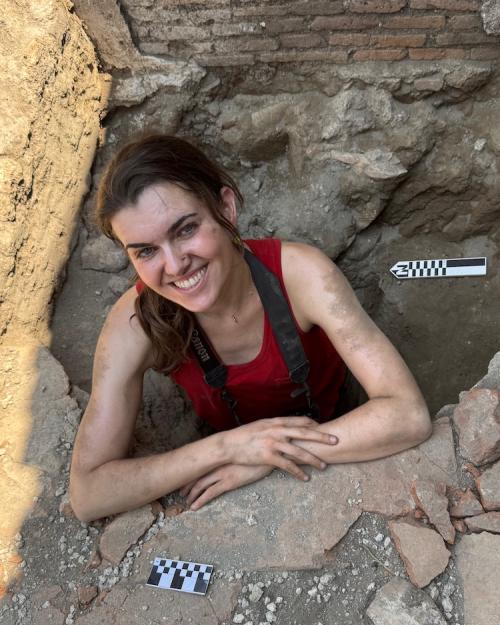Five years ago, on 30 November 2016, Classics lost its longtime administrative assistant Katrina Neff to cancer.
Neff began working in the Classics Department in 2004, initially hired as a temp but later holding a variety of positions, including undergraduate coordinator, graduate field representative, and assistant to the chair. She is remembered fondly for treating the Cornell Classics community as family, even inviting faculty, staff, and students to her wedding to Pat Neff (described by one faculty attendee as “a delightful and joyous occasion”). She was especially supportive of the graduate students, many of whom took turns sitting with her as she went through chemotherapy and hospital stays. To honor her commitment to them, a fund for graduate student travel was set up in Neff’s name shortly after her passing.
Hayden Pelliccia, Professor of Classics and chair of the Classics Department at the time Neff was hired, recalls: “Katrina was hired as a temp by a department manager who, owing to certain budgetary misadventures, was shortly thereafter escorted off the CU premises. Hiring Katrina was the best thing this manager ever did for us, but her sudden departure left me, as chair, with only one full-time administrative assistant and this brand new temp who had never before worked in an academic office. In fact, Katrina was rather intimidated by her new environment - by us, believe it or not. She very much wanted this job to work out and she made great efforts to get things right, which was sometimes a challenge, being as unfamiliar with academic ways as she was. But it soon became clear that the fates had smiled upon us; this was a person committed to making the department run well. By another stroke of luck our wonder-working manager from the mid-90s, Miriam Zubal, agreed to return to us. Miriam waved her wand and got Katrina’s position made full-time and permanent. Katrina became family, and we became family to her...Not long thereafter Linda Brown joined our little office band, and I will say that happiness reigned in 120 Goldwin Smith.”
Miriam Zubal, former Classics administrative manager, agrees with Pelliccia: “Katrina was a real gem. She was a dedicated and hard-working member of the Classics family. She not only did her jobs with efficiency; she was an extremely calm, friendly, and helpful presence in the main office.” Keeley Boerman, who now holds Zubal’s former position, also recalls Neff’s helpful nature, even to those outside of the Classics Department: “Katrina passed away shortly before I started in Classics, but I still remember her fondly as a colleague and would often seek her expertise as a GFA when I first became one in History of Art.”
Classics faculty who worked with Neff remember her not just as helpful and hard-working, but as someone who went above and beyond to make the department function smoothly. Annetta Alexandridis, Associate Professor of Classics and History of Art, says: “[Katrina] joined the department when it was still so male dominated – and she was an authority! I mostly interacted with her (apart from ‘daily life’ issues in Classics) when we needed money from the budget for the plaster casts, which she handled with great efficiency (the cash register was miraculously always full!). Katrina had a dry, matter-of-fact attitude which was not always easy to read (one has to keep in mind that life has not been kind to her; she and her family were hit by several blows of fate), but I think she deeply cared about the department, the plaster casts (the last time I saw her, in the hospital, a few days before she passed away, she asked about them!), and, of course, its people – faculty and students.” Fred Ahl, Professor of Classics, adds: “Unlike the proverbial bureaucrat who makes the possible impossible, she found ways of making the impossible possible without violating rules or laws. Katrina never brought absent-minded and wayward faculty members, like myself, into (necessary) line with the ever-growing, coercive curtness of upper administration, but with coaxing wit and an engaging smile, as if she were asking a favor of us. Katrina was always ready to intervene spontaneously, tactfully, but firmly, whenever she saw a student's concern handled dismissively, even when she too thought it misguided. Her position outside the academic hierarchy afforded her a neutrality which she used as a pretext not for disengagement, but for offering balanced advice, or just a shoulder to cry on. She mediated many issues to everyone's satisfaction with the skill, but without the status, of an ombudsman.”
Above all, those at Cornell who knew Neff admired her ability to make colleagues and students feel like family, in spite of the many personal family tragedies she herself had endured throughout her life. Ahl says, “[Katrina’s] painful, valiant, and ultimately losing struggle with cancer so soon after her marriage was sad recompense for a life spent working with and helping others. In her eyes, everyone, regardless of standing within the social systems of Cornell and of the world, deserved an equal and full measure of respect and attention from herself and from each other. And she did her best to ensure that everyone who came to the office was treated accordingly...Life didn't give Katrina the reprieve she gave others. Those of us privileged to be her colleagues will never forget her.” Zubal adds: “She touched thousands of student lives in a positive way at Cornell, in the College, and most of all in the Classics department. We (faculty, students, and staff) are all better people for knowing and working with Katrina. I still miss her very much.” Pelliccia echoes Zubal’s sentiment: “She was a wonderful friend and colleague who took pride in the department and its denizens, especially the students, whom she treated with a wry but kindly maternalism. All of us who knew her miss her very much.”





